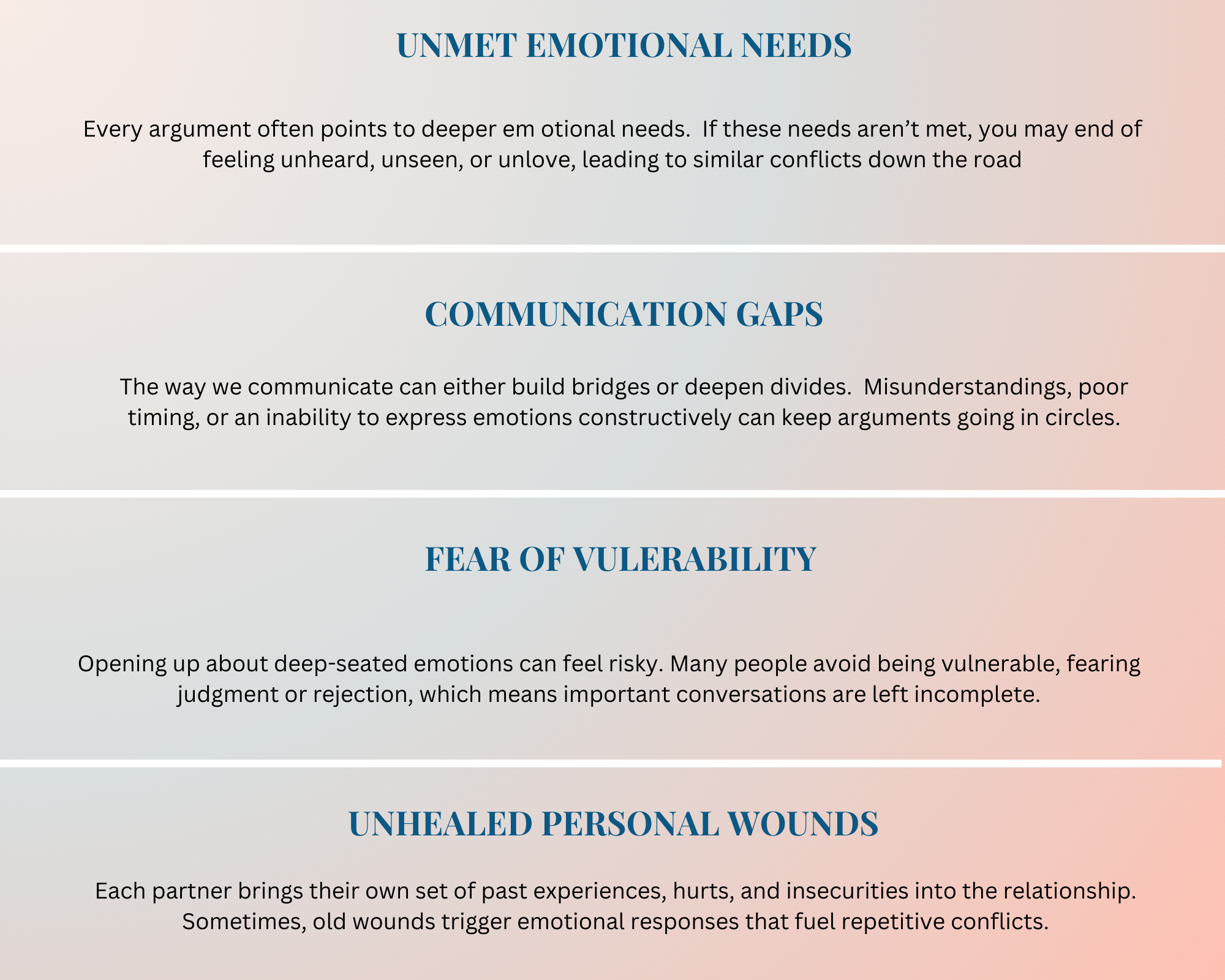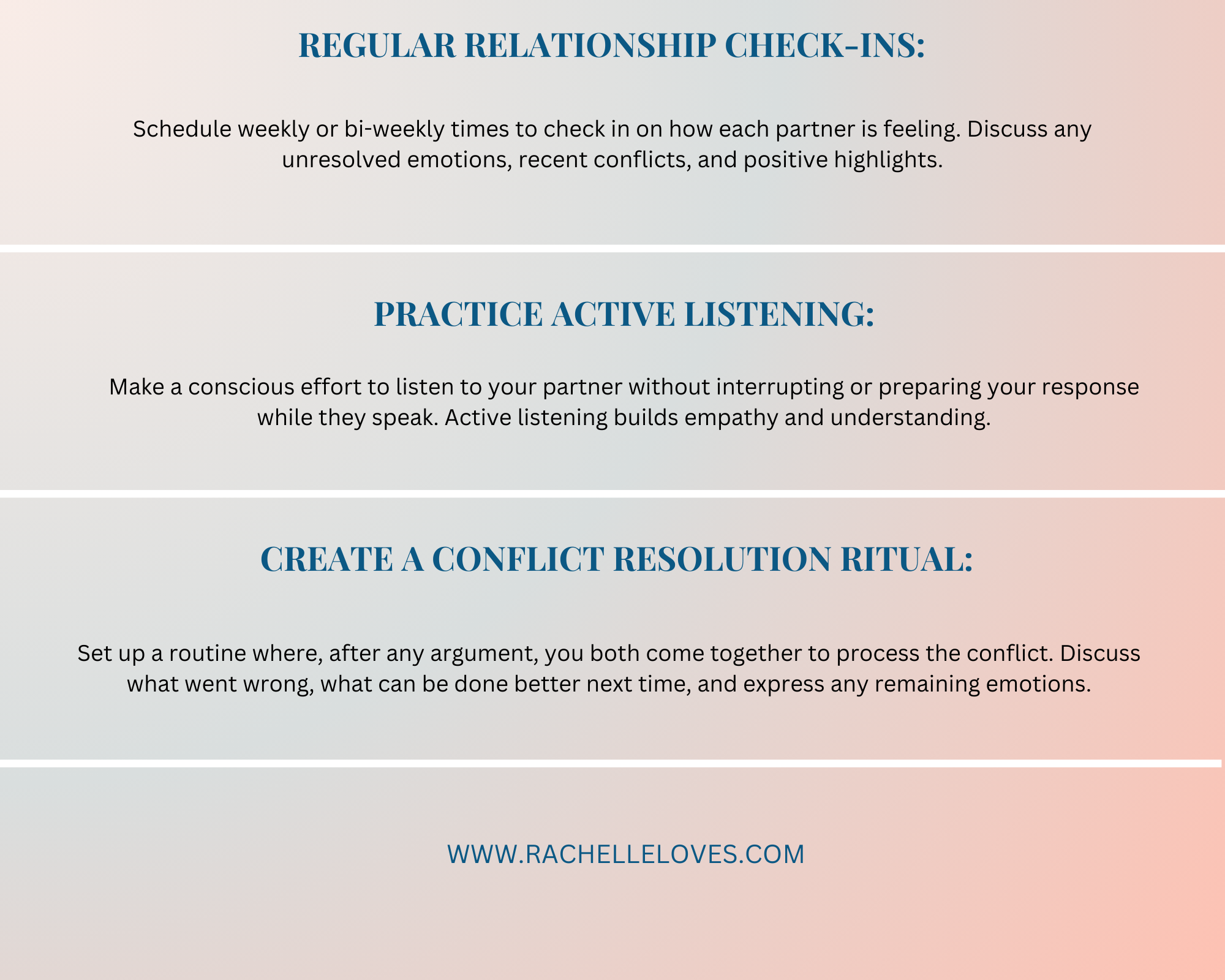Breaking the Conflict Cycle: How to End Repetitive Arguments and Create Deeper Connection in Your Relationship
If you’ve found yourself asking, "Why do we keep having the same arguments, and why can't we resolve them?" you’re not alone. Many relationships, even the most loving ones, can fall into repetitive conflict cycles. These cycles can leave you feeling frustrated, misunderstood, and emotionally drained.
But here's the truth: there is a way to break free from negative patterns and cultivate a relationship that thrives on connection, intimacy, and understanding.
In this blog, we'll explore why these patterns emerge, what they reveal about your relationship, and the steps you can take to create lasting, positive change.
Why Repetitive Conflicts Happen in Relationships
Repetitive arguments often stem from unmet needs, unhealed wounds, or miscommunication between partners. When these core issues aren't addressed, conflicts tend to recur—because, in essence, the underlying problems are still unresolved.
Here are some of the most common reasons why arguments keep circling back:
Reasons for repetitive conflict
Breaking Free From the Negative Conflict Cycle
If you're tired of having the same arguments over and over, it's time to disrupt the pattern. Here's how:
1. Identify the Core Issues
Many repetitive arguments are surface-level expressions of deeper problems. It’s not really about who left the dishes in the sink or who forgot to pick up groceries. It’s more about what’s underlying these surface triggers, like feelings of neglect, lack of respect, or not being valued.
Action Step: Reflect on your last few arguments. What were the common emotional themes beneath the surface? (e.g., feelings of being unappreciated, fear of abandonment, unmet emotional needs). Write them down. Discuss these deeper issues with your partner in a calm and open setting.
2. Shift Your Communication Style
Most conflicts escalate because of poor communication habits. Using defensive or critical language can instantly put your partner on edge, while avoidance or passive-aggressive tactics only prolong the issue.
Action Step: Practice using "I" statements to express your feelings without blame. For example, instead of saying, "You never listen to me!" try, "I feel unheard when we don’t discuss things openly." This allows you to express your emotions without attacking your partner.
3. Recognize Your Emotional Triggers
Repetitive conflicts are often fueled by emotional triggers—specific actions or words that stir up a deep emotional reaction. These triggers are usually tied to unhealed personal wounds or past relationship experiences.
Action Step: Take time to understand your emotional triggers and how they play into your relationship dynamics. When you recognize you’re being triggered, take a moment to breathe and center yourself before reacting. Share your triggers with your partner, so they understand your emotional landscape better.
4. Implement Emotional Regulation Techniques
When emotions run high, it's easy to say or do things that you'll later regret. Learning how to manage your emotions in the heat of the moment is key to breaking negative patterns.
Action Step: Practice grounding techniques like deep breathing, stepping away from the conversation briefly, or engaging in mindfulness practices to calm your nervous system. When you're in a more balanced state, return to the conversation with a clearer mind.
5. Heal and Nurture Your Inner World
Your relationship’s external conflicts often mirror your internal landscape. Healing past wounds, reprogramming limiting beliefs, and cultivating self-love will naturally shift how you respond to your partner.
Action Step: Invest in your personal growth journey. Explore tools like therapy, astrology insights, or self-reflection exercises to deepen your understanding of your inner world. When you heal yourself, your relationship will also experience healing.
6. Commit to Vulnerability and Growth
Breaking free from repetitive arguments requires both partners to be committed to growth. Vulnerability, while uncomfortable, is the key to creating deep emotional intimacy. Sharing your fears, desires, and insecurities openly helps to cultivate trust and understanding.
Action Step: Set aside time to have vulnerable conversations where both of you can openly share your needs, fears, and desires. Approach these conversations from a place of love, not criticism.
Simple Solutions to Break Free From Negative Patterns
Breaking the cycle of repetitive arguments isn't about quick fixes; it’s about committing to growth and connection. Here are some simple solutions to get started:
3 Solutions to Breaking Free From Negative Patterns
Benefits of Breaking the Cycle
When you take the steps to resolve repetitive arguments, several positive shifts happen in your relationship:
Deeper Emotional Connection: With each resolved conflict, your bond deepens, and you feel more connected to your partner.
Increased Intimacy and Trust: When you show that you’re both willing to put in the work, your trust in one another grows, and you become more comfortable being vulnerable.
Greater Relationship Satisfaction: As you heal your relationship's recurring issues, you'll experience more joy, fulfillment, and harmony.
Conclusion: Step Into Your Power as a Creator of Epic Love
Repetitive conflicts may seem like a dead-end, but they can actually serve as opportunities for growth. When you and your partner consciously address your core issues, improve communication, and heal past wounds, you can transform your relationship into one that is truly fulfilling.
Now is the time to step into your power as the creator of your love story. By shifting your approach, you can move from frustrating cycles to a relationship that evolves and deepens in love, intimacy, and connection.
Ready to start? Begin breaking free from repetitive conflict cycles by learning to create your own emotional safety and take responsibility for your part in extinguishing the conflict patterns. Discover the exact steps with my H.E.A.R.T Opening Mini-Couse by clicking on the button below:
By focusing on these steps and embracing your role in creating a conscious and evolving relationship, you'll unlock the door to a deeply satisfying and loving partnership.


